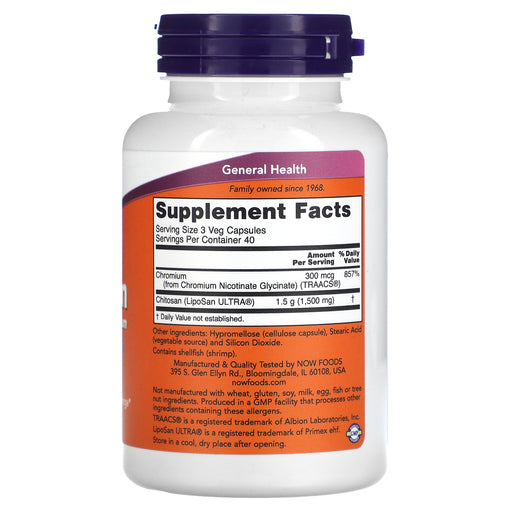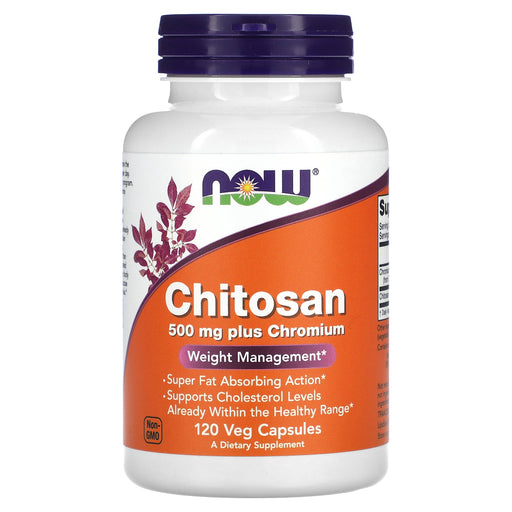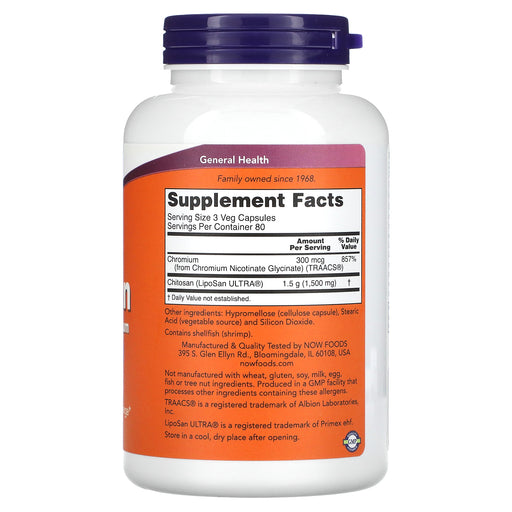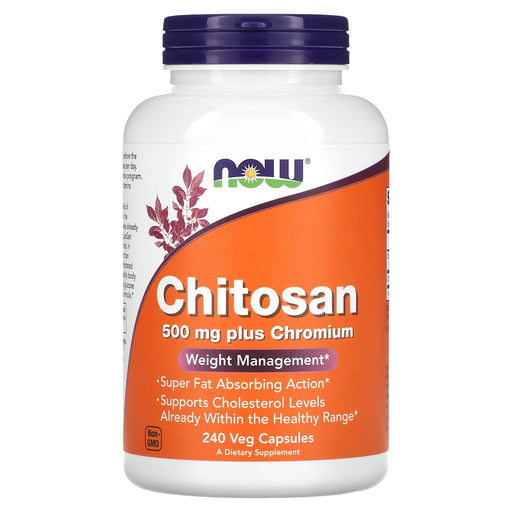
Supporting Weight Management and Heart Health with Chitosan Supplements
If you're looking for a natural way to support your weight loss efforts and promote heart health, chitosan supplements may be worth considering. Derived from the exoskeletons of crustaceans like shrimp and crabs, chitosan is a unique fiber that has been shown to offer numerous health benefits, including aiding in weight management and supporting healthy cholesterol levels.
What is Chitosan?
Chitosan is a type of polysaccharide, or complex carbohydrate, that is obtained by processing chitin, a substance found in the shells of crustaceans. It is known for its unique ability to bind to dietary fats and cholesterol in the digestive tract, which may help reduce their absorption and promote their excretion from the body.
Chitosan supplements are typically sourced from the shells of shrimp or crabs and are available in various forms, such as capsules, tablets, or powders. These supplements are often marketed as natural weight loss aids and cholesterol-lowering agents.
Benefits of Chitosan Supplements
Incorporating chitosan supplements into your health routine may offer several potential benefits, including:
- Weight Management Support: Chitosan's fat-binding properties may help reduce the absorption of dietary fats, potentially leading to reduced calorie intake and supporting weight loss efforts when combined with a balanced diet and regular exercise.
- Cholesterol Regulation: By binding to cholesterol in the digestive tract, chitosan may help reduce its absorption and lower total and LDL (bad) cholesterol levels, promoting heart health.
- Digestive Health: As a type of fiber, chitosan may help promote regular bowel movements, support digestive health, and improve gut microbiome balance.
- Blood Sugar Control: Some studies suggest that chitosan may help regulate blood sugar levels by slowing down the absorption of carbohydrates in the digestive tract, potentially benefiting those with diabetes or prediabetes.
- Antioxidant Properties: Chitosan has been shown to possess antioxidant properties, which may help protect cells from damage caused by free radicals and support overall health and well-being.
Choosing the Best Chitosan Supplement
When selecting a chitosan supplement, it's essential to choose a high-quality product from a trusted brand. Consider the following factors:
- Quality and Purity: Look for supplements manufactured in GMP-certified facilities, free from contaminants and impurities, and third-party tested for purity and potency.
- Appropriate Dosage: Choose supplements that provide an effective daily dose of chitosan, typically ranging from 1-5 grams per day, depending on your individual needs and goals.
- Additional Ingredients: Some chitosan supplements may include other weight management or heart health-supportive ingredients, such as chromium, green tea extract, or omega-3 fatty acids, for added benefits.
- Allergen Considerations: If you have a shellfish allergy, be cautious when using chitosan supplements, as they are derived from crustacean shells. Look for supplements that are clearly labeled as shellfish-free or consult with your healthcare provider before use.
- Brand Reputation: Opt for supplements from reputable brands with a history of producing high-quality, science-backed products and a commitment to transparency and safety.
Tips for Incorporating Chitosan Supplements into Your Health Routine
To maximize the benefits of chitosan supplements and support your weight management and heart health goals, consider the following tips:
- Combine with a Balanced Diet: While chitosan supplements can help support weight loss efforts, they should be used in conjunction with a balanced, calorie-controlled diet rich in whole foods, lean proteins, and healthy fats.
- Stay Hydrated: Drink plenty of water throughout the day to help chitosan bind to dietary fats and cholesterol and promote their excretion from the body.
- Exercise Regularly: Incorporate regular physical activity into your daily routine to support weight management, cardiovascular health, and overall well-being.
- Follow Dosage Instructions: Always adhere to the recommended dosage on the product label, and consult with your healthcare provider before starting any new supplement regimen, especially if you have pre-existing health conditions or are taking medications.
Support Your Weight Management and Heart Health Goals with Chitosan Supplements
If you're looking for supplement to support your weight loss efforts, promote healthy cholesterol levels, and maintain overall well-being, chitosan supplements may be a valuable addition to your health routine. By binding to dietary fats and cholesterol in the digestive tract, these unique fiber supplements can help you achieve your weight management and heart health goals.
Explore our selection of high-quality chitosan supplements and witness the potential of this natural, science-backed ingredient for yourself. With a commitment to purity, potency, and your individual needs, Health Orchard is here to support you every step of the way as you work towards a healthier, happier you.
Frequently Asked Questions about Chitosan
1. What is chitosan supplement used for?
Chitosan is a dietary supplement derived from the shells of crustaceans like shrimp and crabs. It is primarily used for:
- Weight loss: Chitosan is claimed to block the absorption of dietary fat, though evidence for its effectiveness is mixed.
- Cholesterol management: Some studies suggest that chitosan may help reduce total and LDL (bad) cholesterol levels, but more research is needed.
- Wound healing: Chitosan has antimicrobial and blood-clotting properties that may aid in wound healing when applied topically.
- Oral health: Chitosan-based chewing gums and toothpastes may help reduce dental plaque and prevent tooth decay.
- Drug delivery: Chitosan is being researched as a potential vehicle for targeted drug delivery.
It's important to note that while chitosan is generally considered safe, its effectiveness for various uses may be limited, and more research is needed.
2. What is the purpose of chitosan?
The main purposes of chitosan as a dietary supplement include:
- Weight management: Chitosan is claimed to block the absorption of dietary fat, potentially leading to weight loss. However, evidence for its effectiveness is mixed.
- Cholesterol reduction: Some studies suggest that chitosan may help lower total and LDL (bad) cholesterol levels, but more research is needed to confirm these effects.
- Wound healing: When applied topically, chitosan's antimicrobial and blood-clotting properties may promote wound healing.
- Oral health: Chitosan-based dental products may help reduce plaque formation and prevent tooth decay.
- Drug delivery: Researchers are exploring the use of chitosan as a vehicle for targeted drug delivery, thanks to its biocompatibility and biodegradability.
3. What are chitosan side effects?
Chitosan is generally considered safe when taken orally in appropriate doses. However, some people may experience mild side effects, such as:
- Digestive issues: Chitosan may cause stomach discomfort, gas, bloating, constipation, or diarrhea.
- Allergic reactions: People with shellfish allergies may be at risk of allergic reactions to chitosan, as it is derived from crustacean shells.
- Interactions with medications: Chitosan may interact with certain medications, such as blood thinners and diabetes drugs, by reducing their absorption or effectiveness.
- Nutrient malabsorption: Chitosan may reduce the absorption of fat-soluble vitamin A, vitamin D, vitamin E, and vitamin K and essential fatty acids.
- Increased bleeding risk: Chitosan's blood-clotting properties may increase the risk of bleeding, especially in people with bleeding disorders or those taking blood-thinning medications.
It's important to consult a healthcare professional before taking chitosan supplements, especially if you have underlying health conditions, allergies, or are taking medications.
4. What is the best time to take chitosan?
The best time to take chitosan may depend on the specific product and the purpose for taking it. Generally, it is recommended to take chitosan:
- With meals: If using chitosan for weight management or cholesterol reduction, take it with meals that contain fat. This allows chitosan to bind to dietary fat and potentially reduce its absorption.
- As directed: Follow the dosage and timing instructions provided on the product label or as recommended by a healthcare professional.
- Consistently: To potentially see benefits, take chitosan consistently as part of your daily routine.
It's important to note that while taking chitosan with meals may be recommended for certain purposes, this may also increase the risk of nutrient malabsorption, particularly of fat-soluble vitamins. Consult a healthcare professional for personalized guidance on the best time to take chitosan based on your individual needs and health status.
5. Is chitosan safe for kidneys?
Chitosan is generally considered safe for most people when taken orally in appropriate doses. However, there is limited research on its specific effects on kidney health. Some potential considerations include:
- Renal function: In animal studies, high doses of chitosan have been associated with improved renal function markers. However, human studies are lacking, and the effects of chitosan on kidney health in humans are not well-established.
- Interactions with medications: Chitosan may interact with certain medications, such as those used to treat kidney disease, by reducing their absorption or effectiveness. This could potentially impact kidney function.
- Allergic reactions: People with shellfish allergies may be at risk of allergic reactions to chitosan, which could potentially affect kidney function if severe.
- Underlying kidney disease: There is insufficient evidence to determine the safety of chitosan for people with pre-existing kidney disease.
If you have concerns about kidney health or are taking medications for kidney disease, consult a healthcare professional before taking chitosan supplements.
6. What are the benefits of chitosan for kidney?
The potential benefits of chitosan for kidney health are not well-established, as there is limited research in this area. However, some animal studies suggest that chitosan may have certain effects on kidney function:
- Improved renal function markers: In some animal studies, high doses of chitosan have been associated with improved markers of renal function, such as reduced creatinine and urea levels. However, human studies are lacking.
- Antioxidant properties: Chitosan has been shown to have antioxidant properties, which may help protect kidney cells from oxidative stress and damage. More research is needed to confirm these effects in humans.
- Anti-inflammatory effects: Some studies suggest that chitosan may have anti-inflammatory properties, which could potentially benefit kidney health. However, more research is needed to understand the relevance of these effects in humans.
It's important to note that while these potential benefits have been observed in animal studies, there is insufficient evidence to determine the effects of chitosan on kidney health in humans. Consult a healthcare professional for personalized guidance on the use of chitosan for kidney health.
7. Can chitosan lower creatinine?
Creatinine is a waste product produced by muscle metabolism and is commonly used as a marker of kidney function. Some animal studies have suggested that chitosan may have an effect on creatinine levels:
- Reduced creatinine levels: In a few animal studies, high doses of chitosan have been associated with reduced serum creatinine levels, suggesting improved kidney function. However, these effects have not been well-studied in humans.
- Mechanism of action: The exact mechanism by which chitosan may lower creatinine levels is not fully understood. It has been suggested that chitosan's antioxidant and anti-inflammatory properties may play a role in protecting kidney cells and improving renal function.
It's important to note that while these potential effects have been observed in animal studies, there is insufficient evidence to determine the impact of chitosan on creatinine levels in humans. More research is needed to understand the relationship between chitosan and kidney function markers like creatinine.
If you have concerns about your creatinine levels or kidney health, consult a healthcare professional for proper evaluation and treatment. Do not rely on chitosan supplements to lower creatinine levels without medical supervision.












